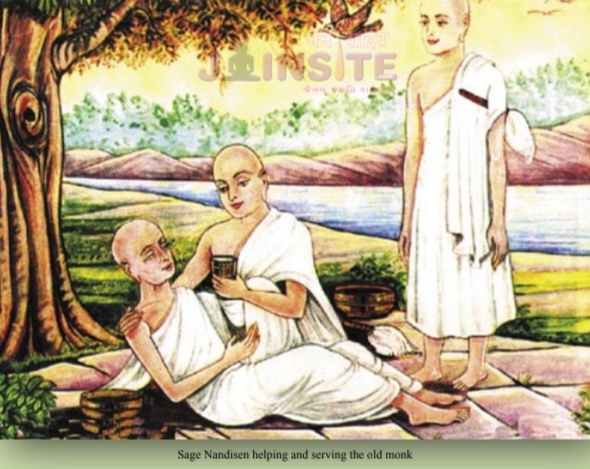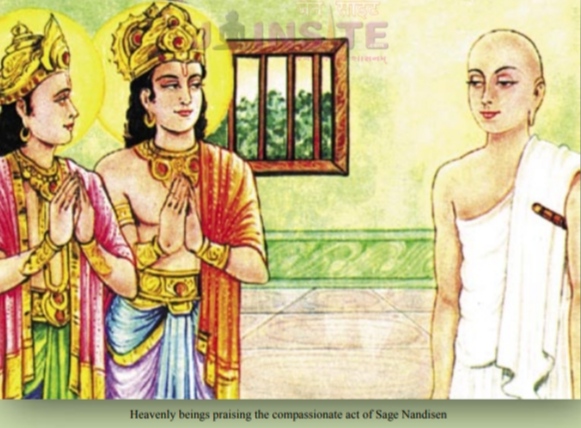Sage Nandisen
Sage Nandisen was a great ascetic and well versed in the scriptures. He took a vow to serve other monks with utmost devotion. His devotion of serving the monks was popular even in the heavenly abode.
One day, Indra commended his services during an assembly of demigods. One of the demigods was surprised at such high praise for a mere mortal and decided to see the worthiness of sage Nandisen.
The demigods, due to their miraculous power, can assume any form they desire and can reach anywhere in a split second. The demigod arrived at the outskirts of the village and assumed the form of two monks.One became a very old and injured monk while the other became a young and healthy monk.
It was the day sage Nandisen was going to break his fast. He had just returned from collecting Gochari (alms) and was about to break his fast when the young monk came to him and said, “Oh blessed one! There is a very old monk suffering from diarrhea, extreme thirst, and hunger. He is weak and needs your help.”

Sage Nandisen helping and serving the old monk
Hearing these words, sage Nandisen immediately got up, took clean water, and went to the old monk. Seeing Nandisen, the old monk raged, “Oh you wretch, I am lying here suffering and you did not even care to see if anyone needs help.”
Sage Nandisen was not offended by these words. He had developed virtues of tolerance, forgiveness, and compassion. He calmly replied, “Oh, the best of monks, kindly excuse my oversight. I have brought clean water for you to drink.”
He helped the old monk drink the water. He cleaned his clothes, his body, and helped him sit up. The old monk again became irritated. He frowned, “Oh you fool, do you not see that I am too weak to sit? What are you doing to me?”
Sage Nandisen said, “I will help you.” After helping the old monk to sit up, he said, “Oh revered monk, if you desire, I shall carry you to the Upäshray (place where monks stay temporarily) where you will be more comfortable.”
The monk replied, “Why are you asking me? You may do so if you wish.”
Sage Nandisen seated the monk on his shoulders and slowly proceeded towards the Upäshray. He walked slowly, watching every step carefully. The old monk was determined to test him so he increased his own weight gradually. With the increased weight on his shoulder, sage Nandisen began to tremble and he almost fell. The old monk said, “Oh you wretch, what is wrong with you? Don’t you know how to walk? You are shaking my entire body. Is this the way to serve the sick?”

Act of Sage Nandisen


